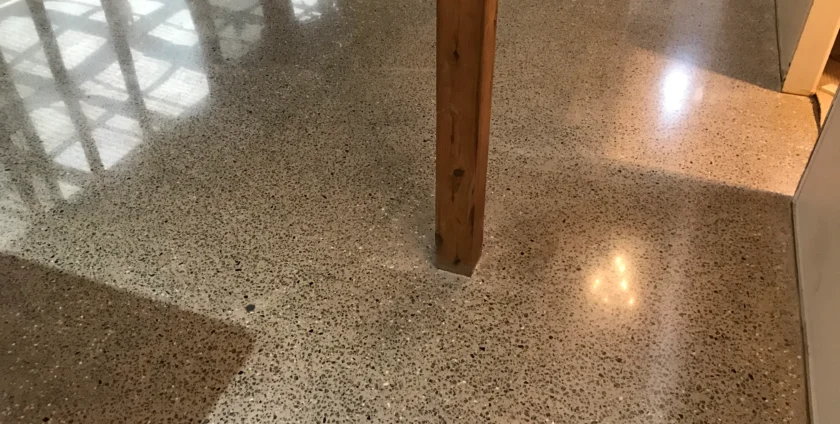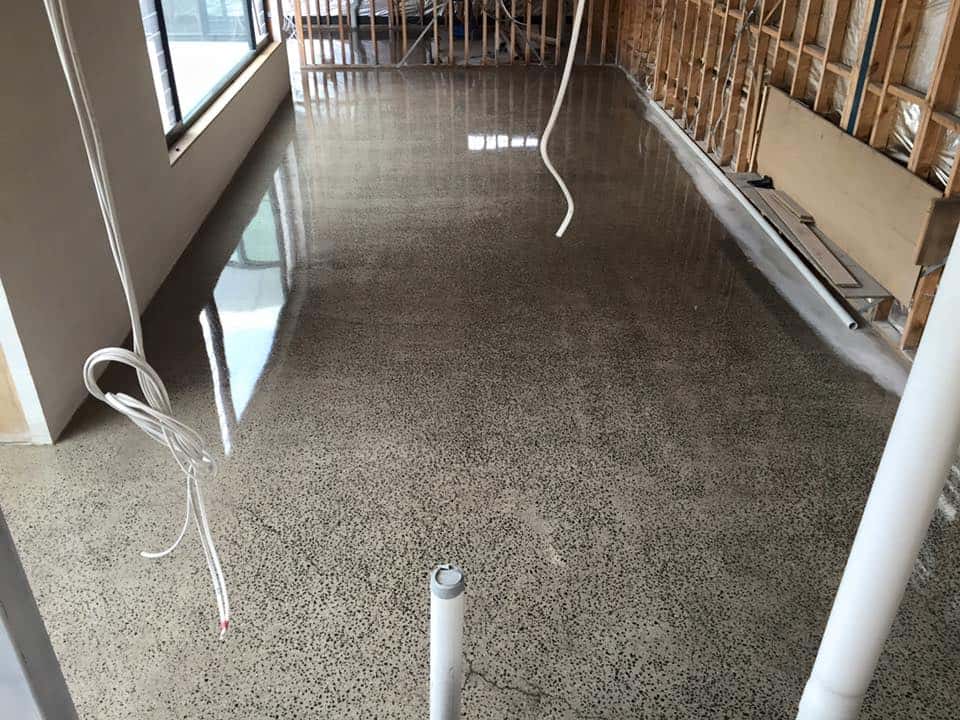
Pros & Cons of Commercial Polished Concrete Floors
Commercial floors go through a lot. An average day may involve hundreds, if not thousands, of footsteps and even machinery or vehicles going over them. So, they not only need to look good and be easy to maintain, but be highly durable as well. This is why commercial polished concrete floors are such a popular choice for businesses and commercial developers.
As the experts in commercial polished concrete in Melbourne, we regularly share the pros and cons of concrete floors with business owners, so we thought we’d share some. You;ll find the benefits, some things to be wary of and some tips for caring for and cleaning them too to help you make a decision for your commercial space.

What is a commercial polished concrete floor?
A commercial polished concrete floor starts as a regular concrete slab that is mechanically ground with abrasive pads to remove imperfections and smooth out the surface. The floor is then polished to a desired shine level using finer grits, resulting in a hard, reflective surface. Sometimes sealants or stains are applied to enhance durability and appearance.
Advantages of Polished Concrete Floors
Durable Commercial Flooring Designed for Heavy Use
Polished concrete is incredibly tough. It stands up to wear and tear well from foot traffic, rolling equipment and even heavy furniture, all things that business floors experience a lot of day in and day out. So, for floors with heavy foot or wheel traffic, it’s a big pro of installing polishing concrete over other types of surfaces that may get damaged or wear down easily.
Low Maintenance Flooring Options That Save Time & Money
One of the biggest pros of polished concrete floors is how little maintenance they need to keep them in good condition. Routine cleaning is as simple as sweeping and damp mopping with a neutral cleaner. Unlike carpet or tiles, it doesn’t require waxing or sealing every few months, saving your business time and money.
Environmentally Friendly & Energy Efficient
As concrete floors use existing concrete slabs, they are more eco-friendly than many other types of commercial flooring options. They don’t need additional materials and reduce waste, and can even help lower energy consumption by improving light from the reflective surface. It’s not just the upfront benefits, but also long-term cost savings too.
Aesthetic & Professional Looking
Reputation is a big deal for businesses, so having flooring that looks clean and professional, and is easy to keep looking that way is so important. The beautiful shiny surface is stain resistant, so you can easily make it look as good as new for years to come with very little cleaning or maintenance.
Disadvantages of Polished Concrete Flooring
Is polished concrete slippery?
A common concern about concrete polished floors is slip safety. It can become slippery, especially when wet, posing risks in commercial environments. However, this can be addressed by applying anti-slip coatings or choosing finishes with higher traction levels to keep everything safe, so it’s not too much of a concern.

Industrial Polished Concrete Can Be Cold
While durable, concrete floors are hard underfoot and can feel cold, which might suit all businesses. If you have areas where your team or clients will be standing for long periods of time, you can help increase their comfort by having mats or rugs, which can also add some personality to the space.
Potential for Cracking & Sound Reflection
Any type of concrete, polished or not, can crack over time due to the buildings settling or temperature changes. Though cracks can be repaired, it’s a factor to consider if you’re weighing up the pros and cons of concrete floors. They also don’t absorb sound, so there may be some echoing in large open spaces, although sound-absorbing materials can help with that.
The Best Commercial Flooring for High-Traffic Areas
Thanks to its toughness and how easy it is to clean, polished concrete is one of the best commercial flooring options for high-traffic areas in businesses. It’s why you’ll see it so much in shopping centres, factories and office lobbies. With the right care, it can last upwards of 20 years, far longer than many other types of flooring, so is also a good choice for long-term cost savings.
Polished Concrete vs. Tiles For Businesses
Businesses often weigh up polished concrete vs. tile if they need non-carpeted flooring and there are, of course, pros and cons to each. Tiles come in a wide range of styles, colours, patterns, textures and finishes, including natural stone and timber-look designs, and can be easy to replace if they are damaged. However, they can crack, chip and require grout maintenance, so polished concrete often outperforms tiles in high-traffic commercial environments.
How to Maintain & Clean Polished Concrete Floors
Commercial Concrete Floor Cleaning Tips
A little daily cleaning will go a long way in keeping your polished concrete floors looking amazing for decades. Sweeping or dust mopping them will help remove abrasive particles that may scratch the surface, so this is a very important daily step. As is damp mopping with a neutral cleaner designed for concrete to keep it spotless without damaging the finish.
When cleaning polished concrete, you should avoid using acidic or harsh cleaning products, bleach or abrasive scrubbers as this can dull or etch the polished surface. Stick to the manufacturer’s recommendations for cleaning agents to protect your investment.
Professional Maintenance of Polished Concrete Floors
If your concrete floors do get a little dull looking or get a crack, calling in a professional polished concrete flooring expert will ensure they return to their like-new condition. Professionals use specialised equipment to safely restore the floor’s appearance without causing damage, and can fix cracks, if they do occur. Our team at Concrete Floor Renovations can help you with any floor maintenance you may need in Melbourne, so you’re always in good hands.
- By: digital
- Category: Blog, Polished Concrete
- 0 comment
